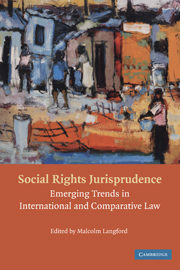Book contents
- Frontmatter
- Contents
- Foreword – Philip Alston
- Preface
- PART ONE OVERVIEW
- PART TWO SELECT NATIONAL JURISDICTIONS
- 4 South Africa
- 5 India
- 6 South Asia
- 7 Colombia
- 8 Argentina
- 9 Brazil
- 10 Venezuela
- 11 Canada
- 12 The United States
- 13 Hungary
- 14 France
- 15 United Kingdom
- 16 Ireland
- PART THREE REGIONAL PROCEDURES AND JURISPRUDENCE
- PART FOUR INTERNATIONAL HUMAN RIGHTS PROCEDURES AND JURISPRUDENCE
- PART FIVE SPECIAL TOPICS
- Notes on Contributors
- Table of Authorities
- Index
- References
9 - Brazil
Impact and Challenges of Social Rights in the Courts
Published online by Cambridge University Press: 05 June 2012
- Frontmatter
- Contents
- Foreword – Philip Alston
- Preface
- PART ONE OVERVIEW
- PART TWO SELECT NATIONAL JURISDICTIONS
- 4 South Africa
- 5 India
- 6 South Asia
- 7 Colombia
- 8 Argentina
- 9 Brazil
- 10 Venezuela
- 11 Canada
- 12 The United States
- 13 Hungary
- 14 France
- 15 United Kingdom
- 16 Ireland
- PART THREE REGIONAL PROCEDURES AND JURISPRUDENCE
- PART FOUR INTERNATIONAL HUMAN RIGHTS PROCEDURES AND JURISPRUDENCE
- PART FIVE SPECIAL TOPICS
- Notes on Contributors
- Table of Authorities
- Index
- References
Summary
INTRODUCTION
The adoption of the new Constitution in Brazil in 1988 ushered in a new era of social rights protections and a nascent jurisprudence on the topic. Supported by a broad-ranging recognition of social rights, the Brazilian judiciary has issued a number of seminal decisions that have positively affected the realisation of these rights, particularly the right to health. This chapter examines the protection of social rights in the Brazilian Constitution of 1988, emphasising the innovations and advances the Constitution has produced by identifying these rights, for the first time, as fundamental rights. From this constitutional analysis, the chapter moves on to examine the justiciability of social rights in Brazilian courts, analysing cases relating to the right to health and education and evaluating the response of Brazilian courts to the interpretation and implementation of social rights. Finally, the chapter draws some conclusions on the impact of social rights judgments in Brazil and offers thoughts on ways to address the challenges of ensuring a fuller use of the justiciable possibilities.
SOCIAL RIGHTS IN THE 1988 CONSTITUTION
The Brazilian Constitution of 1988 represents a legal landmark in the country's democratic transition and in the movement towards the institutionalisation of human rights. Reflecting the ‘post-dictatorship’ democratic consensus, this constitutional text marks the break with the era of the authoritarian military regimes that had held power since 1964.
- Type
- Chapter
- Information
- Social Rights JurisprudenceEmerging Trends in International and Comparative Law, pp. 182 - 191Publisher: Cambridge University PressPrint publication year: 2009
References
- 4
- Cited by

